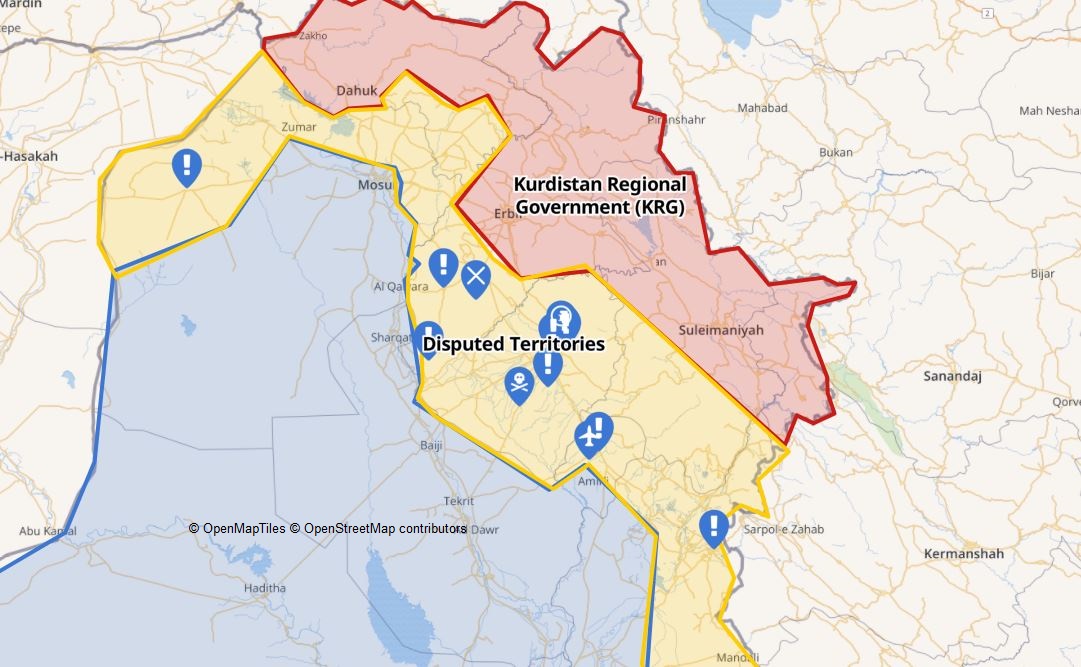1K
Kirkuk
- On Friday, September 24th, the Iraqi security media cell announced the arrest of an ISIS (Da’esh) group consisting of three terrorists responsible for collecting information about the locations of security forces and checkpoints in the Hawija district. The cell was arrested near the Zab subdistrict. Furthermore, on Saturday, September 25th, the federal police announced they ambushed a Da’esh team attempting to bombard the Rashad subdistrict. According to police, after clashes, two Da’esh terrorists were killed, and three others fled. In the city of Kirkuk, police defused an IED in the Mosala neighborhood. Meanwhile, the spokesperson for Iraq’s security operations, General Tahseen al Khafaji, officially announced the formation of two divisions consisting of Peshmerga forces and the Iraqi army to deploy in the disputed territories. According to al Khafaji, the joint forces will be equipped, paid, and commanded by Iraq’s Defense Ministry. After months of talks and renegotiations between Erbil and Baghdad, the combined force has formed amid increasing Da’esh attacks in the region.
- The head of the Iranian-backed Shia party, al Badr in Kirkuk, Mohammed al Bayati, told Shafaq news they were not “rejecting” the return of the Kurdistan Democratic Party (KDP) to Kirkuk “as a political party that has the right to exercise its political activities.” The KDP returned to Kirkuk before the parliamentary elections after nearly four years on a ban imposed by the Iraqi government. Al Bayati also accused Kirkuk’s administration, headed by the acting governor Rakan Saed of “marginalizing” Kurds and, particularly, Turkmen.
- According to statistics from Iraq’s State Organization for Marketing of Oil (SOMO), 3,000,309 oil barrels have been exported from Kirkuk fields via the Cihan pipeline in August. SOMO said Kirkuk’s oil was sold for $69.23 per barrel grossing more than 208 million US dollars. Separately, Kirkuk North Oil Company (NOC) said it uncovered the piercing of the Kirkuk-Cihan pipeline near the Sargaran sub district by smugglers. NOC said they launched an investigation, but they are unsure of the amount stolen and the period of oil theft.
- Kirkuk’s Agriculture Department announced that the Iraqi government would not buy corn produce from farmers for the first time in five decades, a decision made by the Ministry of Finance. In the last fifty years, the Iraqi government has bought the corn crop from Kirkuk farmers, even as much as 30% of their production in 2020. Kirkuk produces 500,000 tons of corn annually, topping the most productive in the country. The decision angered farmers, and it will reduce corn crops in the coming years.
- The Independent High Electoral Commission (IHEC) said that 130 candidates are running in Kirkuk for the October 10th parliamentary election. IHEC said 56 candidates are running independently while the rest are members of political parties. The 130 candidates are competing for 13 parliamentary seats, of which, one is designated for the Christian quota. The Kurds are aiming to win at least half of Kirkuk’s seats.
Khanaqin
- Seven Kurdish candidates are running in Khanaqin in the October 10th parliamentary elections, risking the loss of the one seat they won in previous elections. Based on the new electoral laws, three parliamentary seats are designated for the Khanaqin region, including Arab towns and districts such as Jalawla (Golala).
Tuz Khurmatu
- In a press conference, the head of the Patriotic Union of Kurdistan (PUK) in Tuz Khurmatu, Bakhtyar Hijran, said that 600 Kurdish families remain displaced in the Kurdistan region. Hijran said the Kurdish families have not returned since their displacement on October 16, 2017, since their homes were burned down, while some families have members in the Peshmerga forces. On October 16, 2017, Iranian-backed militias burned dozens of Kurdish homes when they occupied the town and removed Peshmerga forces in the aftermath of the independence referendum held by the Kurds.
- Iraq’s Joint Operation Command announced the death of four Da’esh in the Hamrin mountain on Sunday by an airstrike.
Makhmour
- Several activists and public figures called for an immediate solution for the deterred security situation in Makhmour. Da’esh terrorists continue to use the Qara Chokh mountain to launch attacks and kidnap civilians. The appeal statement said that 90% of Kurdish villages in Makhmour had been evicted. The Makhmour region has more than 40 Kurdish villages.
Shingal (Sinjar)
- The Mayor of Shingal Mahama Khalil warned of a possible boycott of the Yazidis in the upcoming elections. After seven years of the Yazidi Genocide, the region lacks security and primary services, while tens of thousands remain displaced in the Kurdistan Region.

